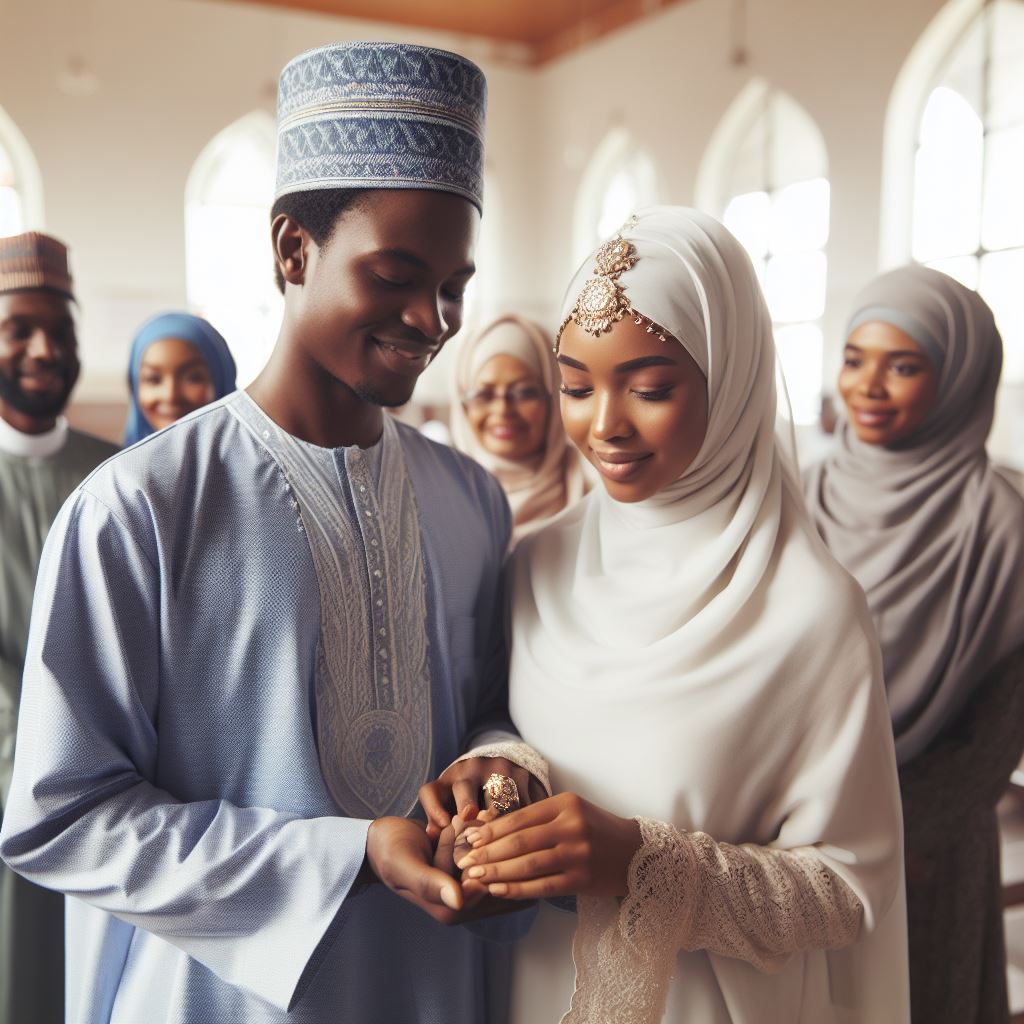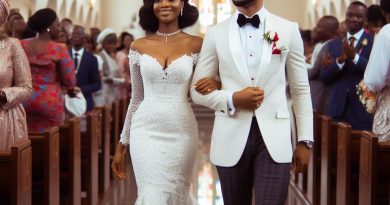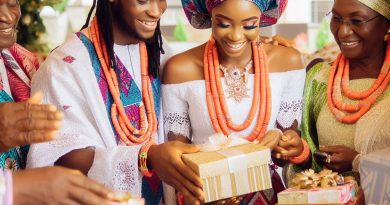Nikah Khutbah: Significance and Common Practices in Nigeria
Last Updated on January 28, 2024
Introduction
Nikah Khutbah in Nigeria reflects a blend of religious tradition and local customs.
The ceremony symbolizes the commitment and union of two souls in the eyes of Allah.
Typically held in a mosque, it begins with a recitation from the Quran.
The Imam officiates, guiding the couple through the religious rites.
Nigerian Nikah Khutbah is often an elaborate affair, attended by family and friends.
It emphasizes the importance of commitment, love, and respect in marriage.
Couples exchange vows, expressing their intentions to live by Islamic principles.
A significant moment involves the bride’s consent, affirming her willingness to marry.
Gifts, especially the Mahr (dower), hold cultural and religious importance.
Guests offer blessings and enjoy a feast to celebrate the union.
Nikah Khutbah in Nigeria encapsulates the sanctity of marriage and cultural richness.
Historical Background
Origin and History of Nikah Khutbah
- The Nikah Khutbah, a sacred Islamic tradition, dates back to the time of Prophet Muhammad in the 7th century.
- It serves as the official marriage sermon, emphasizing the sanctity of marriage and the roles of spouses.
- The Nikah Khutbah has its roots in the Quran, where marriage is considered half of a person’s faith.
- Prophet Muhammad’s teachings in Hadith further elucidated the significance of the Nikah Khutbah in joining two souls.
Introduction of the Ceremony to Nigeria
- The Nikah Khutbah made its way to Nigeria through Islamic scholars and traders around the 10th century.
- As Islam spread across West Africa, the Nikah Khutbah ceremony gained prominence in Nigeria.
- Local customs and Islamic practices intertwined, leading to a unique blend of traditions.
- Over time, the Nikah Khutbah became an integral part of Nigerian Muslim culture.
- The ceremony is celebrated with zeal, uniting couples in accordance with Islamic traditions and local customs.
The Nikah Khutbah’s origin lies in the teachings of Prophet Muhammad, with its introduction to Nigeria occurring through the historical spread of Islam in the region.
This ceremony has seamlessly integrated into Nigerian Muslim culture, preserving its sanctity while adapting to local customs.
Read: Celebrating Walimah: The Sunnah of Islamic Wedding Feast
Significance of the Nikah Khutbah
A Nikah Khutbah holds great importance in a Muslim wedding ceremony in Nigeria.
It plays a significant role in the wedding and carries spiritual symbolism.
Let’s explore the significance of the Nikah Khutbah in more detail:
Role of the Nikah Khutbah in a Muslim wedding
- The Nikah Khutbah is a sermon delivered by the Imam who officiates the wedding.
- It is a moment where the couple and their families gather to hear words of wisdom and guidance.
- The Khutbah serves as a symbolic reminder of the couple’s commitment to each other and their faith.
- During the Khutbah, the Imam advises the couple on their responsibilities and duties towards each other.
- It also emphasizes the importance of maintaining a strong connection with Allah in their married life.
- The Khutbah provides spiritual nourishment to the couple, preparing them for the journey ahead.
- It serves as a unifying factor for the community, as everyone witnesses the solemnization of the marriage.
- Through the Khutbah, the community reaffirms its support and blessings for the couple.
- It also reminds the attendees of the sanctity of marriage and the sacred bond it represents.
Symbolism and spiritual significance of the ceremony
- The Nikah Khutbah symbolizes the contract and commitment between the bride and groom.
- It reflects the couple’s pledge to Allah and their intention to follow the teachings of Islam throughout their marriage.
- The Khutbah reminds the couple to seek Allah’s guidance and blessings in all aspects of their life together.
- It serves as a spiritual bond, strengthening the connection between the couple and their faith.
- Through the Nikah Khutbah, the couple acknowledges that their union is not only a physical and emotional partnership, but a spiritual one as well.
- The ceremony emphasizes the importance of love, respect, and companionship within the marriage.
- It highlights the need for mutual understanding, sacrifice, and communication to build a successful marital life.
- The Nikah Khutbah also carries a message of unity, reminding the couple that they are part of a larger Islamic community.
- By involving the community in the ceremony, the couple receives the support and prayers of their family, friends, and fellow Muslims.
Generally, the Nikah Khutbah holds immense significance in Nigerian Muslim weddings.
It plays a crucial role by providing guidance, blessings, and spiritual nourishment to the couple.
The ceremony symbolizes the commitment between the bride and groom, reminding them of their duties and the importance of their faith in their marital life.
It also serves as a unifying factor for the community, reaffirming their support and blessings for the couple.
The Nikah Khutbah carries deep spiritual symbolism and serves as a reminder of the sacred bond created through marriage.
Read: The Concept of Polygamy in Islam: Nigerian Perspectives
Gain More Insights: Court Marriages in Nigeria: A Step-by-Step Guide
Common Practices in Nigeria
Preparations for the Nikah Khutbah
- Selection of the venue and date
- Invitation of guests and attendees
Rituals and traditions during the ceremony
- Introduction of the Islamic scholars or imams
- Recitation of verses from the Holy Quran
- Exchange of marital vows between the couple
- Proclamation of the bride’s consent by her wali
Traditional customs and cultural elements
- Traditional attire and appearance of the couple
- Offering of prayers and blessings for the couple
- Exchange of gifts and dowry negotiations
The Nikah Khutbah in Nigeria is an important Islamic ceremony that signifies the solemnization of a marriage.
It is a significant event that involves various practices and customs unique to Nigerian culture.
Preparations for the Nikah Khutbah
The first step in preparing for the Nikah Khutbah is the selection of the venue and date.
This is usually done in consultation with the couple’s families and is based on factors such as convenience and availability.
Once the venue and date are finalized, the next step is to send out invitations to guests and attendees.
This is done to inform friends, family, and well-wishers about the upcoming ceremony.
Rituals and traditions during the ceremony
The Nikah Khutbah ceremony begins with the introduction of Islamic scholars or imams who lead the proceedings.
They are responsible for guiding the couple and ensuring that the ceremony adheres to Islamic customs and traditions.
Following the introduction, verses from the Holy Quran are recited to seek blessings for the couple.
This is believed to bring good fortune and divine intervention in their union.
The couple then exchange marital vows, expressing their commitment and love for each other.
The proclamation of the bride’s consent by her wali, usually her father or a male relative, follows.
This is an important step to ensure that the bride willingly agrees to the marriage.
Traditional customs and cultural elements
One of the highlights of the Nikah Khutbah in Nigeria is the traditional attire and appearance of the couple.
The bride and groom are dressed in traditional Nigerian clothing, reflecting their cultural heritage.
This adds beauty and color to the ceremony.
Additionally, prayers and blessings are offered for the couple’s happiness, prosperity, and a blissful married life.
This is done by the Islamic scholars and imams, who recite prayers from the Quran and make supplications on behalf of the couple.
Finally, the exchange of gifts and dowry negotiations takes place between the families.
This is a customary practice that symbolizes the joining of two families and is intended to ensure the financial stability and security of the bride.
In general, the Nikah Khutbah in Nigeria is a significant event that encompasses various practices, rituals, and customs.
From the preparations for the ceremony to the rituals conducted during the event, each aspect holds cultural and religious importance.
The combination of Islamic traditions and Nigerian customs makes the Nikah Khutbah a unique and memorable occasion for the couple and their families.
Read: Islamic Marital Counseling in Nigeria: Benefits & Places

Modern Adaptations and Challenges
Influence of Western culture and globalization on the Nikah Khutbah
- The modern era has witnessed the influence of Western culture and globalization on the Nikah Khutbah in Nigeria.
- With the advent of globalization, there has been an increasing exposure to different cultures and traditions.
- As a result, some couples in Nigeria have started incorporating elements of Western culture into their Nikah Khutbah.
- For instance, the exchange of wedding rings, which is not traditionally part of the Nikah ceremony, has become common.
- This influence has also led to changes in the language and content of the Nikah Khutbah.
- In some cases, couples choose to have their Nikah Khutbah conducted in English rather than the traditional Arabic or local language.
- Globalization has also led to greater interfaith marriages, which further contribute to the diversification of the Nikah Khutbah.
Introduction of personalization and customization
- Another modern adaptation in the Nikah Khutbah is the introduction of personalization and customization.
- Couples are now more inclined towards making their Nikah ceremony reflect their unique personalities and preferences.
- They want their Nikah Khutbah to be a reflection of their values, beliefs, and aspirations as a couple.
- Personalized vows and speeches are becoming increasingly common, allowing the couple to express their love and commitment to each other.
- Couples often incorporate elements like songs, poems, or even stories into the Nikah Khutbah, adding a personal touch to the ceremony.
- This trend of personalization and customization allows couples to create a meaningful and memorable Nikah Khutbah.
Gender equality and diversity in the ceremony
- In recent years, there has been a growing emphasis on addressing gender equality and diversity in the Nikah Khutbah.
- Traditionally, the role of the bride and the groom was defined within certain gender roles.
- However, as society progresses, there is a desire to break free from these traditional norms and promote equal participation.
- Couples in Nigeria are increasingly seeking to include gender-neutral language and inclusive practices in their Nikah Khutbah.
- For example, both the bride and groom may give speeches or make vows, emphasizing their equal importance and responsibilities in the marriage.
- Furthermore, there is a recognition of the diversity within Nigerian society, and couples aim to incorporate multicultural elements into their Nikah Khutbah.
- This may include readings or prayers from different religious traditions or the inclusion of cultural rituals and practices from both families.
In essence, the Nikah Khutbah in Nigeria has undergone modern adaptations due to the influence of Western culture and globalization.
Couples are personalizing and customizing their ceremonies, incorporating elements that reflect their unique preferences and identities as a couple.
There is also a growing emphasis on addressing gender equality and diversity, with couples seeking to break free from traditional norms and promote inclusivity.
These modern adaptations have enriched the Nikah Khutbah, making it a more meaningful and inclusive ceremony for couples in Nigeria.
Read: Rights and Responsibilities: Husband-Wife Dynamics in Islam
Conclusion
The Nikah Khutbah holds great significance in Nigeria as it marks the formalization of marriage in the Islamic tradition.
The sermon not only relays important religious teachings but also emphasizes the responsibilities of both partners in their marital journey.
Common practices during the Nikah Khutbah include recitation of relevant Quranic verses, supplications, and the delivery of a sermon by an imam or knowledgeable individual.
The sermon often covers topics like marriage, love, respect, and the importance of maintaining a strong connection with Allah.
Nikah Khutbahs also serve as a social gathering, bringing together family and friends to witness the union of two individuals.
It is a celebration of love and commitment, fostering unity and strengthening the bonds within the community.
Reflection on the significance of preserving traditions while embracing contemporary changes
As times change and society evolves, it is essential to hold onto our traditional customs and practices.
The Nikah Khutbah serves as a beautiful example of striking a balance between preserving traditions and embracing contemporary changes.
While the core elements of the Nikah Khutbah remain unchanged, such as the recitation of Quranic verses and the exchange of vows, there is room for adaptation to reflect the needs and values of the present generation.
This allows the ceremony to remain relevant and meaningful to couples and attendees alike.
By preserving traditions, we honor our heritage and ensure that future generations can experience the richness of our cultural practices.
At the same time, embracing contemporary changes allows us to adapt and cater to the needs and preferences of an evolving society.
In a nutshell, the Nikah Khutbah holds immense importance in Nigeria, not only as a religious ceremony but also as a cherished social event.
It is a testament to the harmonious blend of tradition and modernity, reminding us to cherish our customs while embracing the necessary changes to keep them alive and relevant.


